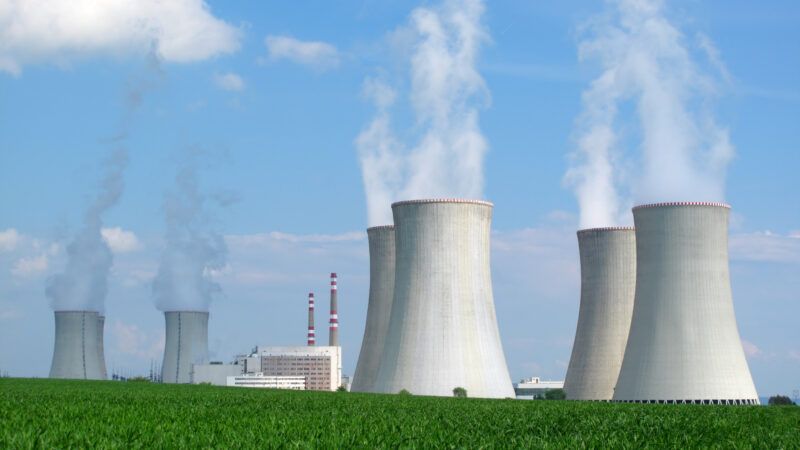Celebrate Earth Day by Going Nuclear
Sunbeams and breezes are too fickle. The most climate-friendly power source is using magic rocks to boil water.

"Our power, our planet" is the theme for the celebration of the 55th Earth Day, which is today. The organizers are calling for "renewable energy generation, globally, to be tripled by 2030." Consequently, they urge the billion or so Earth Day celebrants to "support and adopt the rapid transition to renewable energy sources now, be it solar, wind, hydro-electric, tidal or geothermal." Their goal is to cut back on burning coal, oil, and natural gas that emit carbon dioxide into the atmosphere, where it contributes to man-made climate change.
Entirely unmentioned by the earnest Earth Day activists is the emissions-free energy produced by "magic rocks," a.k.a. uranium, that fuel carbon-free nuclear power. Nuclear power plants currently produce about 9 percent of the world's electricity. Globally, nuclear energy is the second-largest source of carbon-free electricity, following hydropower. Nuclear power plants supply a steady stream of electricity, unlike intermittent solar and wind power.
To get some idea of the advantages of nuclear power, let's compare electricity production in Germany vs. France. In a ridiculous overreaction to the Fukushima nuclear disaster in Japan, Germany chose in 2011 to begin closing down 17 perfectly fine nuclear power plants. The last three were shut in 2023.

Conversely, next-door-neighbor France announced in 2022 that it would build six new plants and perhaps as many as eight more. France is currently the world's largest net exporter of electricity due to its very low cost of generation, and brings in over 3 billion euros per year from this, according to the World Nuclear Association.

The carbon dioxide emissions of both countries have been dropping, but largely as a result of their differing polices with respect to nuclear power, France emits 4.1 metric tons vs. Germany's 7.1 metric tons per capita.

Keeping in mind that the cutoff of Russian natural gas to the European Union after that country's invasion of Ukraine in 2022 has roiled the region's electricity markets (especially Germany's), let's compare the recent price of electricity in France and Germany. In Germany, the household price of electricity was recently just shy of 40 cents per kilowatt-hour. In France, the price was just under 25 cents per kilowatt-hour. For comparison, the average price in the U.S. is over 16 cents per kilowatt-hour.
Overregulation has stymied the deployment of new advanced safer, greener, and cheaper nuclear power plants. It is past time that Earth Day celebrants recognize that magic rocks beat fickle sunbeams and breezes when it comes to producing steady power that can protect our planet. Happy Earth Day to all.
